Today, I’d like to present to you something a little different; an interview of sorts.
A while ago, a comment on one of my blog posts really caught my attention. In it, a mother was describing an experience her young daughter had at school, and that brief description had such a powerful impact on me that I shared it with my own children. They told me that people need to hear this story, and I agree.
We feel it is very important to get these kinds of stories out so that:
- those who are unaware that these kinds of things still go on, learn that they do, and perhaps understand how these events impact us and;
- those that have experienced similar things find out that they are not alone.
I contacted the family and asked if they would be willing to participate in an interview, to which they very graciously agreed.
To respect the family’s desire for anonymity, all names have been changed. Here is Ruby’s story, in the words of her parents, and then from Ruby herself.
Ruby and Indian Residential Schools
Ruby was seven years old and in Grade 2. She was assigned to prepare a class presentation on the topic of her choice. The only requirement from the teacher was that the student know a lot about it. Students needed to prepare a poster at home and some research was encouraged. The students were to inform their teacher of their topic before they started their poster.
Ruby’s presentation date was scheduled by the teacher. She decided right away that she wanted to share something about her First Nations culture and background because she felt that the level of understanding and knowledge about this issue was lacking in her class. After much thinking, she finally decided that she wanted to tell the story of why she doesn’t speak her First Nations language that she loves so much.
Ruby decided that she wanted to share information about the effects Indian Residential School has had on her family and community in terms of language loss. Her eyes were moist with emotion but her voice was sure and certain. This was a very important topic that meant a lot to her. She wanted everyone to know about how wrong Indian Residential Schools were.
A few weeks before the scheduled presentation date, Ruby and her dad, Chris, spoke to the teacher after school. Ruby stated that she wanted to do her presentation on Indian Residential Schools and how the legacy of these schools explains why she can’t speak her language. The teacher suggested she teach the class a few words in her language or about hunting or fishing.
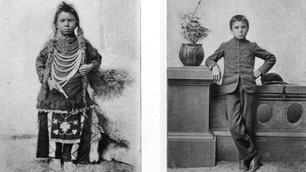
“I want to get rid of the Indian problem. I do not think as a matter of fact, that the country ought to continuously protect a class of people who are able to stand alone… Our objective is to continue until there is not a single Indian in Canada that has not been absorbed into the body politic and there is no Indian question, and no Indian Department, that is the whole object of this Bill.” Dr. Duncan Campbell Scott - 1920
Ruby’s father then asked Ruby to say one more time what she wanted to share. Ruby wanted to share the reason why she doesn’t know much of her language, because of the Indian Residential Schools. The teacher then approved the project.
However, the next day after school the teacher called Faith, Ruby’s mom, into the classroom while Ruby waited in the hallway. The teacher said she had been thinking about it all night because she didn’t know how to say “no” the day before. The teacher said it was an inappropriate topic and had many excuses:
- we the parents were putting our daughter up to it,
- our daughter was too young/immature to tell her family’s story,
- the other students were too immature to hear the story,
- the students might get bored,
- the teacher claimed to be too unfamiliar with the topic for our daughter to teach about it in her class.
The excuses went on.
Through all her arguments, Ruby’s mother quietly asked her questions. Had the teacher read the children’s literature about Indian Residential Schools that is available in the local library?
The teacher’s answer was no, to which Faith replied, “Well, our daughter has.”
Then Faith asked, how was teaching about Indian Residential School inappropriate when it was okay to teach about war and Remembrance Day? The teacher had taken the school to the local cenotaph and talked about war with the young students and this topic was not considered inappropriate or too mature. Faith reassured the teacher that Ruby would not be talking about sexual abuse in her presentation.
“It doesn’t matter what you say,” was the teacher’s response. “This is my classroom and my answer is ‘No!'”
Faith’s explained that the teacher would have to tell Chris and Ruby that the project was no longer approved. The teacher elected to setup a meeting with the principal instead.
Afterwards, the two of us sat with Ruby on the couch and talked about what happened. Ruby usually loves school, but she started saying that she didn’t want to go back. That is something we had never heard her say before. Ruby was very hurt and deeply grieved.
Her school had given her the message that her story is unacceptable and unimportant. That she, because of her culture and how Residential Schools had had an impact on shaping her life, is unacceptable and unimportant.
Ruby was also very concerned that this would happen to her siblings as well. We spent a lot of time talking and crying together on the couch.
It was a very difficult time. We decided that we couldn’t be alone in this. As a family, we went and visited with people. At church, one lady who works with Residential School Survivors as a psychology councillor encouraged Ruby, and us, to not give up. We are so grateful for our community.
The principal mediated our meeting with the teacher. The end result: the teacher very reluctantly agreed to allow Ruby to share her story. We explained to the teacher that Ruby wanted to share about the apology and say a prayer for the Survivors. The following day, the teacher apologized to Ruby, but then told her that she had better not scare anyone or give them nightmares because of her presentation.
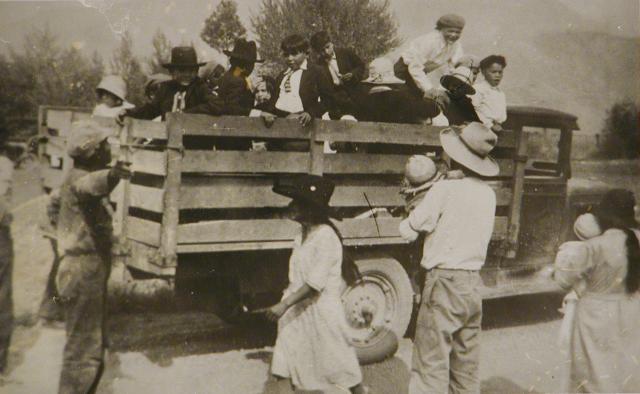
Why deny that this is the stuff of nightmares? Children Ruby's age rounded up in a cattle truck to attend Kamloops Indian Residential School.
The day of Ruby’s presentation finally came. However, the teacher did not let her start the presentation at the appointed time. Twice Ruby asked her teacher to start her presentation. The teacher said the class needed to finish up more work first.
Finally, shortly before the end of school, she was allowed to present. The students were very interested and wanted to learn more. However, the teacher cut Ruby off and made her stop half way before she had even gotten to the apology or prayer for healing. The class was then given plenty of time to ask questions.
At the end of the question period, the teacher had nothing positive to say about Ruby’s presentation. The only thing said was, “You should choose a shorter topic next time.”
Ruby is hoping to share more about Indian Residential Schools with her classmates and is learning more about other issues facing Aboriginal people, such as underfunding of First Nations schools. On Valentine’s Day, she asked her principal if he would support the initiative to send e-Valentines to the government in support of First Nations children in Canada. The principal said that he would take a look at it.
Ruby’s experience, in her own words
As a mother of children Ruby’s age, I long ago got rid of any belief I may have had that children cannot speak for themselves. It baffles me utterly that anyone who works with children could forget this simple fact. My daughters were also very curious to hear Ruby describe her experience and I sent her a number of questions so that her voice could be heard as well.
I am very grateful to Ruby for her courage. It is clear that this experience impacted her deeply and by answering these questions, she has been also asked to relive that hurt.
Below are the questions, and Ruby’s answers.
How old were you when you first heard about Residential Schools?
I think I was about 6 years old.
How did this topic come up?
When I was in Grade 1, my teacher said that I was only allowed to speak English at school. I didn’t know why people didn’t want us to speak our First Nations language. I talked to my Mom and Dad about it. Then my Dad told me about Residential Schools. He also told me about his hair getting cut off at school, even though he didn’t go to a Residential School. Then my Dad showed me the movie of the apology from Prime Minister Harper. When we talked to my Grade 1 teacher about it, she said that she was sorry about it and I forgave her.
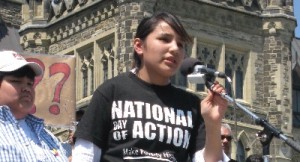
Shannen Koostachin of Attawapiskat First Nation showed us once again that our children are capable of taking leadership roles. Her dream was that all First Nations children would one day have equal access to high quality education.
What do you think Residential Schools have to do with First Nations languages?
They took away our language by taking kids from their moms and dads. At school, the sisters and brothers were split up and couldn’t even talk to each other either. The teachers at Residential School thought their ways and their language were better. And now we speak English and do not know much of our language. Our family is taking a language class together now so that we can all learn.
What did you want other students in your class to learn?
I chose the topic of Residential Schools because people need to know about the past. I wanted to tell my classmates why I couldn’t speak very much of my language. The past is our history and everybody should know. Our class learns some history like Remembrance Day and wars, so we should also talk about Residential Schools so that it won’t happen again.
How did your teacher’s actions make you feel?
I felt mixed-up between sad and hurt when my teacher didn’t want me to tell the class about Residential Schools. Then when she did let me share, she stopped me before I could tell about the Prime Minister’s apology or pray for healing for people who went to Residential School. My teacher didn’t tell me anything good about my presentation, she just said that I should choose a shorter topic next time. But I still think that this was an important topic.
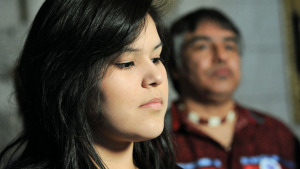
16 year old Chelsea Edwards has continued the fight for equal education for all children in Canada, and is the Spokesperson for Shannen's Dream
How did the other students react to what you shared with them and how did that make you feel?
One student was fooling around but the rest looked serious and listened. Some of the students looked sad when they heard about Residential Schools. Lots of kids had questions during question time, more than any other presentation. It made me feel good that they were interested and wanted to know the truth. They thought that the Residential Schools were totally not fair or right.
Why is teaching people about Residential Schools important to you?
No one is First Nations like me in my classroom. So there are quite a few people who don’t know about my culture or about the past. I think that all kids in Canadian schools should know about Residential Schools because this happened here and justice and truth are very important. I don’t want something like this to ever happen again in our land.
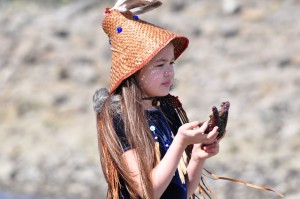
Ta'Kaiya Blaney of Sliammon First Nation sings and acts, often in her Sliammon language. She also works to raise awareness about the proposed Northern Gateway pipeline and its potential environmental impacts. Only 10 years old, she has been speaking to adults and children alike about these important issues.
Do you believe that you are too young to learn about or teach about Residential Schools?
No, I am not too young because I started learning in Grade 1. I talked with my family about it. I read Shi-Shi-Etko and Shin-Chi’s Canoe in Grade 1. Then later in Grade 2, I read more books for kids about Residential Schools. I know enough to teach others about it and I am still learning more about Residential Schools.
Is there anything you would like to say to other young First Nations, Inuit or Métis youth after this experience?
Be brave. It takes courage to stand up for what’s right. You may face some troubles, but it is worth it. Because you can do it with God’s help. The Creator gives us our culture and gives us courage. When I prayed about it, I felt better because I knew that God was with me.
Don’t stand in their way
A few weeks ago, I asked, “How do you teach children about Residential Schools?”
I think Ruby’s story tells us that we should avoid standing in the way of children when they want to learn about something, and when they want to take on the role of teacher. There are many young people in our communities who have wisdom to share and the passion to lead. They should not be impeded by adults who feel threatened by these children and by the knowledge they wish to share.
If we want our children to be invested in their education, we need to invest in them. It sounds trite and obvious, but it is clearly a truism that has not actually sunk in yet.
I suspect however, that children like Ruby, Shannen Koostachin, Chelsea Edwards, Ta’Kaiya Blaney and so many others, will make it impossible for us to continue ignoring uncomfortable truths. They make it impossible for us to believe that children do not possess wisdom, spirit and bravery. Children are not merely “the future” who can only make change once they become adults. They are making change now.
Many, many thanks to Ruby and her parents for telling this story, and many thanks as well to those in the community who supported the right of a child to not only learn about her history and culture, but also supported her right to share that learning.
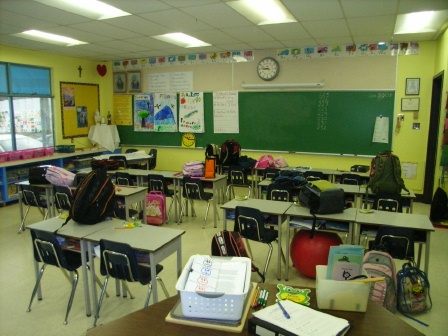
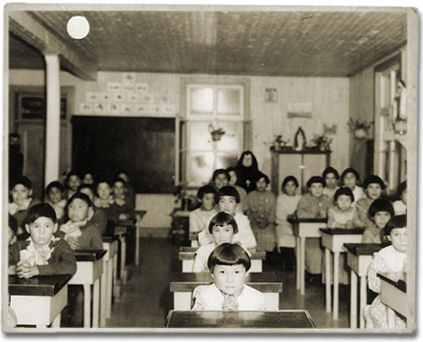
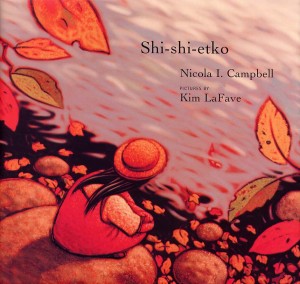
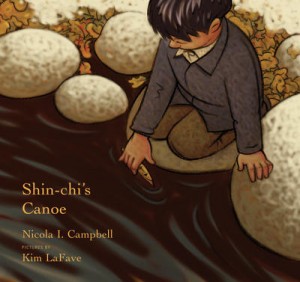
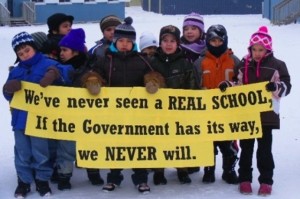
44 Comments
Debra Huron · March 16, 2012 at 11:15 am
This brings tears to my eyes. Children know truth when they see it. Having adults who support them in standing in their truth makes them even stronger.
This is a story of beauty and spirit, unconquered by mainstream neuroticism and denial. Thank you for sharing it.
Amy Bombay · March 16, 2012 at 11:24 am
Thanks so much for sharing this – it brought tears to my eyes. Like Ruby, documenting and teaching others about the legacy of Indian Residential Schools is so important to me (my family was also impacted). I was wondering if you could share information about my research study I am conducting at Carleton University exploring the intergenerational impacts of Residential Schools. Although we all know how the impacts of these schools continue to affect our families – there has been no empirical research on the topic – which for many non-Aboriginal peoples (and the government), is necessary to get them to listen and believe. Thanks so much for your great blog.
We are looking for Aboriginal individuals over the age of 18 to complete a confidential study relating to Indian Residential Schools. It is NOT necessary that you or anyone in your family attended Residential School.
I am a First Nations PhD student at Carleton University. I am conducting a follow-up study to my original research on the intergenerational effects of Indian Residential Schools in which we identified certain factors that put children of Residential School Survivors at greater risk for poor well-being (we would be happy to share these findings with you if you contact us).
In the current study, we are hoping to identify additional factors associated with well-being among children of Residential School Survivors and among Aboriginal adults whose parents did not attend Residential School. This study has received clearance by the Carleton University Psychology Research Ethics Board.
The first phase of the study will consist of questionnaires that will take approximately 50-70 minutes to complete, which will ask about your relationship with your parents while growing up. The main goal of this phase of the study is determine how often Residential School Survivors spoke to their children about their experiences, and what impacts this communication (or lack of communication) had.
Upon completion of these questionnaires, you will be mailed a $10 gift certificate (choice of Tim Hortons, Walmart, Loblaws, or Cineplex Odeon/Famous Players). You will also be asked whether you would like to take part in phase 2 of this study.
Your questionnaire will be coded so that your name will not appear on any materials used for data analysis. Your responses will remain completely anonymous and will in no way identify you as a participant.
If you’re willing to participate, you have the following options for completing the survey:
• You can complete the survey online at http://www.copewell.carleton.ca – click on the Indian Residential School Study icon on the left side of the screen, and follow the instructions. OR
• You can have the survey mailed to you with a return stamped envelope.
If you have questions or wish to have the survey mailed to you, email me at abombay@connect.carleton.ca.
sharon jackson · March 16, 2012 at 11:27 am
The photo of the children in the cattle truck breaks my heart. The little person trying to climb out is one of the saddest things I have ever seen. The government also took children away from Doukhobors and many of those children suffered the same trauma.
Interestingly, my grandfather who was Irish was considered an orphan. He did have a mother but no father. He was sent to a residential school in a town called Kesh, and the horrors of that school were so public that they were talked about in Parliament in London and the school was eventually closed. Governments all over the world do this to children of certain groups of people.
It is like there is a world-wide war on children. By the way, way to go Ruby! And shame on that teacher. I hope Ruby can forgive her for her ignorance.
âpihtawikosisân · March 16, 2012 at 12:17 pm
I recently listened to an unbelievably horrific story about the Nova Scotia School for Coloured Children which sounded so familiar. Children are indeed often made targets, and it is important that this not be forgotten.
One of the things that really got me was how Ruby said that the first teacher who told her that she had to speak English in class apologised, and that Ruby forgave her. That act of forgiveness alone is something to commend her for. I think Ruby has already forgiven a lot. I only hope one day her teacher and others like her become worthy of that forgiveness.
Cynthia Preston · March 16, 2012 at 12:13 pm
Congratulations to Ruby and her family for their persistance. I wonder if Ruby took a little time at recess to talk to her classmates in the playground?
Too many adults are afraid and are embarrassed by their own ignorance, so much is expected of them today the thought of educating themselves on Native history within “Canada” is something they just don’t want to do, perhaps the cannot stand the thought of examining their own conciousness in relation to other peoples. It takes work and working at something when teaching for a lot of teachers is NOT a passion, but a job, makes the task of educating the ignorant much harder. I think perhaps it is in the smaller communities across Canada where transformation is and will happen. These teachers and children don’t have the same pressures as in the major centres where the shear weight of numbers slows down change. They take there knowledge with them when they head off to post secondary, to teachers conventions, to professional improvement weekends etc.
But just as the educating our children on the dangers of smoking effected change faster in a generation than all the complaining of non smokers to smokers over previous generations. So too can this same vector of change be used to educate we the ignorant over the next generation.
We need to believe and support our youth Native and Non Native in honesty, compassion, and our ability to change, to forgive, to receive, to transform…………….
âpihtawikosisân · March 16, 2012 at 12:18 pm
Ruby’s mother did at one point say that Ruby had planned to do little ‘teach-ins’ at recess.
Jeffrey Canton · March 16, 2012 at 12:20 pm
This post is awesome!!!! Thank you so much Ruby for putting yourself out there like this and to you for allowing us to hear this story – a story that so many of us need to hear!
I have been sharing your blog posts with my students in the Children’s Studies program at York University over the past four months and I can’t tell you how incredibly indebted I am to you. It not only helps those of us who are non-Aboriginal to re-think how we think about these critical issues but you are also framing your posts in ways that truly and profoundly touch all of us who read them deeply. This past week we explored the report that youth submitted to the United Nations, Our Dreams Matter Too; we’ve read Larry Loyie, Margaret Pokiak-Fenton and Shirley Sterling’s books for children and teens and Thomas King’s Massey Lectures but I think I need to make your blog a part of my course readings. You take us places that we need to see – painful as many of them are – and for that I truly thank you!
john lavers · March 16, 2012 at 1:13 pm
i am very torn apart by the refusal of canadian society to even talk honestly about the abuse done in resic=dential school, let alone seriously rectify that abuse. it was genocide, and the truth and reconcilliation commisioner has acknoledged that. most canadians have not. i spent a few years reading the history of the conquest of the americas. it is very hard reading if you read the actualy words of the leaders in each sucessive war. repeatedly they openly acknowledge making war on civilians and major atrocities, from the pequot war to the war on the great plains. as i said it’s hartd reading but it should be done. untill canadians and americans acknowledge ane do reparations for their past they will never have healthy and creative democracies. i have to say wehn i discuss these issues on line i am usually subjedted to ad homminen attacks and denial after denial. the native holocoust shouls be taught in schools.
LunarCritter · March 16, 2012 at 1:21 pm
This story is very touching. My heart goes out to Ruby.
nokamis · March 16, 2012 at 1:24 pm
Excellent focus on such a vital topic!
For Ruby: You have a very very important voice and I am encouraged by you and your family’s bravery, forgiving hearts and tremendous courage to stand up for what is right. Well done!!
Aleigh · March 16, 2012 at 1:48 pm
Thank you to both you and Ruby for sharing this. As a non-aboriginal, I struggle with the ignorance of family members (not my parents; they’re the best), co-workers, and so on when it comes to First Nations culture and history. I want to do my best to make sure that *my* son understands, and that I never hear him say the shameful things I have heard from other people. I have looked into the books that Ruby mentions, and I think they will be a wonderful resource for us.
Perry Bulwer · March 16, 2012 at 5:03 pm
What a powerful story! Ruby is a heroine and an inspiration.
I attended the Truth & Reconciliation Commission hearings this past Monday & Tuesday in Port Alberni on Vancouver Island. Three days later I am still overcome with emotion. It was a profoundly moving experience. Reading this article today so soon after feels like an extension of those hearings. One of the most inspiring events occurred on Tuesday afternoon, when the children from haahuupayak, http://www.haahuupayak.com/page/about/ an independent school on the Tseshaht First Nation territory, sang for the survivors. It is hard to put into words how powerfully hopeful that was, especially after just hearing stories of how their elders were prohibited from doing that very thing. I saw the future that day.
I provided the Commission with a written statement and supplemented that with a private oral statement, which partly focused on the crucial educational component of the TRC’s mandate. At the end of my oral comments, the camera person asked me a couple questions, such as what I thought reconciliation means and how that could be achieved. In response to how that could be achieved, I said that this history needs to be taught in all elementary schools, that I wished I had learned about it at a much earlier age. I gave the example of the environmental movement. As environmental issues began to be taught at younger and younger ages, elementary school children became more and more actively involved in initiating conservation practices in their homes and communities. They began to change the world, or at least try, because they were given the necessary information.
What Ruby has done at her school is truly amazing and inspires me greatly. Her insistence on focusing on the loss of language in her presentation was right on the mark. At the hearings, I heard speaker after speaker lament the loss of their language, their voice. Ruby’s insistence on educating her classmates is so admirable, and their eagerness to learn so hopeful.
I think the Commission would be grateful to hear Ruby’s story in her own words, as it speaks so clearly and powerfully to its purpose. Ruby is already so far ahead of most adults on this subject. As she says, she has learned enough so far to teach others, and she does. She is a true leader.
Athapee · March 16, 2012 at 5:18 pm
Here’s a story of students from a private girls school in Winnipeg making a presentation to encourage the Manitoba School Boards Association to teach native studies in school:
http://www.winnipegfreepress.com/local/native-studies-urged-in-schools-142900115.html
Lynn Norris · March 16, 2012 at 5:48 pm
My wife of 55 yrs went to residential school in Fort Frances, & she would like the mail in forms to relate her experience during these years.
Perry Bulwer · March 16, 2012 at 6:11 pm
Here is the contact info and website link of the TRC. The website does not appear to have any downloadable forms, but I might have missed it.
The Truth and Reconciliation Commission of Canada
Head Office
1500-360 Main Street
Winnipeg, Manitoba
R3C 3Z3
Telephone: (204) 984-5885
Toll Free: 1-888-872-5554 (1-888-TRC-5554)
Fax: (204) 984-5915
email: info@trc.ca
http://www.trc.ca/websites/trcinstitution/index.php?p=3
Emo · March 17, 2012 at 10:50 am
And, while I don’t mean to be a jerk about it, in discussions like this I’m compelled to remind everyone that the fact is that we still don’t have a “body count” for how many children died in the schools, and that is indeed partly because the government intentionally purged (i.e., burned) its records, leaving us with only the church archives to study.
To quote Wikipedia (i.e., the bible of our times),
“Similarly, as of 2011, the Canadian government’s own inquiry is uncertain as to the total number of students intentionally or unintentionally killed: in reflecting on the Truth and Reconciliation Commission’s research, Justice Murray Sinclair told the Toronto Star “Missing children — that is the big surprise for me, […] That such large numbers of children died at the schools. That the information of their deaths was not communicated back to their families.”[12] With no source or explanation, the same article suggests the total number of deaths to be “in the hundreds”; many official statements avoid offering any estimate, e.g., in a legal report reviewing an array credible sources, the Canadian Bar Association simply concludes that “Student deaths were not uncommon”.[13] [What a turn of phrase!] Meanwhile, in the absence of other evidence, unofficial sources have extrapolated very rough estimates in excess of 50,000 deaths, using epidemiology from a single medical doctor’s report (discussed further below, under mortality rates), and applying it to the whole country.[14] While neither estimate can be accurate, both extremes demonstrate the absence of reliable numbers circa 2011-2012.”
http://en.wikipedia.org/wiki/Canadian_Indian_residential_school_system
Jason · April 5, 2012 at 8:36 pm
I would be surprised if the numbers of deaths were not in the tens of thousands. It remains a dark shadow on our history and no matter if the Prime Minister pays it lip service by apologising, the condition of our aboriginal peoples remains directly related to continued colonialism by his government. I hope we can find the truth behind these stories sooner rather than later and help put a lot of this true grief behind us. Ruby deserves a chance to do her full report – maybe her parents should tape it and put it on youtube for all Canada tosee. Go Ruby.
@mmeveilleux · March 18, 2012 at 12:25 am
Hi Ruby,
I wish I had been your teacher when you wanted to tell your story. The fact that you were denied this opportunity (initially, at least) affirms for me the importance of giving voice to the story of residential schools. I love both of the picture books that you have shared – Shi-shi-etko and Shin-shin’s-canoe. I hope you will be patient and persistent in sharing these stories. Sometimes, the hearers are not ready. This does not mean the stories are not worth telling.
God bless,
Ingrid (@mmeveilleux)
Sarah · March 27, 2012 at 12:18 pm
That is an outrage that Ruby wasn’t given her head in presenting her topic. This is real history and this is vital for understanding the present. If I ever hear about something like this happening in my son’s school I’ll hit the roof. [Truth in advertising: I’m no where near you or, I suspect, Ruby’s family. In NYC, USA. Wish I was there, though, just to raise some hell over this.]
Bruce Weaver · April 2, 2012 at 5:17 pm
I would very much like to use Ruby’s story as a reading in my church to help the congregation better understand issues about having a voice, bullying by authorities and the many other understandings that can be gleaned from this story.
I would like to begin with a brief comment about how I found this story and a few details about you and your blog. Our church has devoted several Sunday’s to Native issues and we are currently looking at balance in our lives.
Cheers,
Bruce
Nicola Campbell · April 5, 2012 at 4:12 am
I just wanted to commend “Ruby” for having the courage to stand up for what her vision and following through with her dream in sharing her story. The teacher sounds horrifyingly racist. The kind of teacher who is carrying on the abuse by being abusive to her student. Good for Ruby for being the champion, for having the courage to stand up to this teacher. It almost seems that a letter should be written in complaint about the teachers conduct and treatment of Ruby throughout this process.
I also wanted to thank you for showing my two childrens books as part of this blog. I appreciate this. With my second book, Shin-chi’s Canoe, I ran into something similar in Alberta when Shin-chi’s Canoe was up for the 2009 TD Award. The CBC had coordinated a contest where the school classroom with the winning cheer would have a classroom presentation with the author, this was me. When the producer noticed there wasn’t enough entries for the contest he started calling various schools in Alberta, personally inviting them to enter. What the CBC producer told me later was that he was a little bit appalled that there were actually school principals who turned down the opportunity entirely because of the topic my books covered. This was incredibly disappointing. I guess this just shows where society is at, which is incredibly unfortunate.
But regardless, as children, our elders were champions, they had the courage to persevere and if they did not have that courage, what little would we have today. I am thankful for our champions, like Ruby. Stand up for what you believe in sweetheart. Don’t ever let her or any other teacher or person to not educate the world. Sending you prayers of joy, courage, love and inspiration to keep doing what you do.
Bonnit · April 5, 2012 at 8:26 am
It is sad that this sort of thing continues in the schools today. I am not aboriginal but I have cousins who are, and in the mid 70’s I attended a public school with one of them in my class. Up until the teacher realized that he and I were cousins I was treated like any other white child. After that I was subjected to abuse and name calling (being called a ‘fat squaw’ and ‘wagon burner’ were the least of the insults hurled my way by the teacher and eventually several of my classmates), which escalated to the teacher putting her hands around my throat and squeezing. I ran from school and straight home to my mother. Now, considering what I had inflicted upon me simply for having aboriginal cousins even though I’m white I can’t even begin to describe what my cousin went through at the hands of this teacher.
I grew up knowing about residential schools and what happened to the aboriginal children sent there. It was talked about by the adults when I spent time on the reserve visiting my cousins. It was always heartbreaking to hear their stories about being ripped away from their loving families and forced to act ‘white’ and being severely punished for trying to observe any of their traditional rites, speak their own language, or even wearing their hair in braids. These things need to be taught so that Canada does not repeat this sort of treatment again. It is a shameful past but there is not a single country in the world that does not have some shameful event in their history and it is more shameful to hide it.
YotD · April 5, 2012 at 11:52 am
I saw the link on FB and had to read the story. My mother, who gave me up for adoption, and all my aunts and uncles were “victims” of residential schools. I was adopted into a white family, but was always made aware of my heritage. In fact, my white family made sure that I was a registered Status Indian. Only within the last few years have I become aware of what my immediate blood family had gone through. The stripping of who we are. The attempted assimilation. It doesn’t matter what brainwashing methods are used, you can never take who we inherently are, out of us. I am ashamed that man in general could have such a closed mind, and realize that it is still happening to a certain degree in many communities. I was referred to as a “wagon-burner and squaw” throughout school. I didn’t understand the thinking back then, but I do understand now. The misconceptions people had of Natives.
I thank the Great Spririt and Mother Earth for giving us the resiliency to deal with situations like this. I wish I could take away the negativity for Ruby, and for all the generations, but it is there. Ruby is a shining example of how to deal with situations. Head on, and with pride in who and what you are.
Linda Cooper · April 6, 2012 at 2:49 am
I am sure my response on Huffington Post where I first saw a portion of the article will not be approved. After reading the full article, I feel my response is even more appropriate here. My husband is full blood Seneca and my own family has far removed native roots. I was raised to respect and learn from elders, respect nature, take only what you will use and use everything you take.
When I was Ruby’s age, I knew in my heart what they were teaching in school was wrong when talking about how America was discovered. I didn’t know how I knew it, my mother said I could hear the truth through the lies. I spent a lot of time in the library reading books way above what the schools called my “level of ability”. If there is a topic children want to know about, they will seek out the information.
Knowing your family history and wanting to share it with others is not an age related thing. For far too long “Good Christians” have shoved their beliefs down the throats of anyone they feel needs “guidance.” After a few hundred years, little has changed. Residential schools also known as Indian schools in America were started and ran by “Christian” organizations because God forbid, they could not let an entire race of people, whose social and moral structure was more advanced then their own, continue to live their lives in peace. Because whites refused to grasp the concept that we live with the land and are the caretakers of it, not the owners, Indians had to be murdered, forcibly moved off their ancestral lands to reservations in the middle of nowhere. Far away from their “civilized” settlements.
A small child knew more about the truth than a paranoid teacher, who it appears has her own issues with prejudice and the real history of the aboriginal people of North America. That child showed more maturity than the teacher, who told the child she “should have chosen a topic that wasn’t so long” yet her own classroom had questions and wanted answers. The teacher missed a learning moment, not only for her students but for herself.
michael watson · April 6, 2012 at 3:39 pm
Thank you for this thoughtful, well researched post. I am both moved by the content, and aware that you have found a lovely, powerful way to empower a young woman in sharing her concerns, her journey, and the obstacles she faced/faces – raised by an antagonistic culture of denial. I am glad to be able to share this post with others!
Sasha · May 28, 2012 at 9:38 pm
I’m soo sorry for what happened to you Ruby, people can be very ignorant at times. I’m currently doing a proejct on what happened in those residential schools, and i still can’t believe those things actually went on in CANADA, especially. Your right though, people need to know this, and understand what hapepned; not put it aside. Thank you for sharing your story
Lynne · December 13, 2012 at 10:24 pm
Ruby I am so sorry you were treated badly and that residential schools were so vile. It is history and people should know about it. You are a very brave, intelligent girl. I know you will do very well as you grow older. Thank you for sharing your story.
A.j. · February 28, 2013 at 5:32 pm
… Thank you for putting this up. It’s beautiful and brilliant and… amazing. So thank you. Thank you. Thank you.
rurhie · December 18, 2013 at 8:50 pm
May Creator always be with these children. Children will teach this world what it has forgotten.
Jen · June 7, 2015 at 8:20 am
I stumbled across this story on Facebook and as the Mom to a son in Gr.2 I was curious. I’m so glad I took the time to read! Ruby is a brave little girl and her famy must be very proud of her and I hope she’s proud of herself for standing up for herself. We are a white family with no aboriginal ties or history, but this week as the TRC report was released, my spouse and I were talking about and my son started asking questions. We answered as honestly as we could. He was appalled that kids could just be ripped away from their families and clearly understood how wrong it was. I Didn’t realize there were children’s books on the subject – we will definitely look for those from our local library.
Thank you Ruby for sharing your story! It has reached more children than just your grade 2 class!
Buffy Williams · June 7, 2015 at 9:27 pm
The atrocities of the residential schools are an important part of Canadian history, and Ruby sounds like an uncommonly intelligent, and perhaps gifted child. That being said, as a parent of a child in Grade 2, I would be FURIOUS if someone decided it was ok for my child to hear about something so heartbreaking at his age. While it has directly affected Ruby, and is extremely important to her, and her family, her need to talk about it doesn’t require other children her age to hear about it yet. My child’s school discusses the fact that there was a war, but does not discuss the atrocities of war with 7 year olds. Nor should any details of residential school be shared with children that age without parental permission.
âpihtawikosisân · June 8, 2015 at 7:40 am
I think you are making unwarranted assumptions about the level of detail that Ruby was trying to share with students. She most certainly was not introducing the graphic violence and abuse; she was explaining what the schools were, who had to go to them, and why that meant she cannot speak her own language. This is equivalent to learning about a war, without learning of the atrocities until later. There was nothing age inappropriate about her presentation.
Kerry · March 24, 2017 at 2:24 pm
Thank you for sharing this story. I am a white woman teaching grade 5/6 students and am working hard to incorporate as much teaching as I can about the TRC and the impact of colonisation and residential schools on First Nations people. However, I am always concerned about misrepresenting the history and/or missing an important voice, especially as my lived experience was one of white, euro-centric privilege. In addition to reading all I can, is there any advice that you would give to an educator like me?
Nii K'an Kwsdins (aka Jerry Adams) · May 23, 2018 at 4:18 pm
School is about growing, teaching is about sharing I am very proud of Ruby for her strength and courage to speak the truth about her loss of her language and why this happened to her people. A true leader in the making if not already a leader. I think this teacher should take lessons from this young woman about how to be inclusive of everybody. It is sad to see that children are still oppressed by some incompetent school systems and by an ignore teacher that totally needing some sensitivity training and history lessons as well. The teacher is the one that needs therapy for her fears and insecurities. Sometimes we have to teach the little ones about unhealthy adults and especially adults that are in their roles of authority. We as adults forget that children take in a lot more than we realize. Children are resilient and smart, we the adults are the ones that stop their freedom of love and caring. I hope Ruby will be told that one person cannot stop her telling any story she wants to share with anyone. That is how our oral history is passed on. T’ooyaksiy’ N’iin. (Thank You) Nisga’a Nation
Ruby · September 6, 2018 at 10:33 pm
Hi. I’m Ruby and you probably just read my story. I am really encouraged and uplifted that people still read my story. Everyone’s thoughtful comments really meant alot to me. Thank you Chelsea Vowel for sharing my story.
âpihtawikosisân · September 7, 2018 at 9:38 am
Thank you for your courage and for sharing your story, years ago now! I hope this school year is going well for you 🙂
Censoring Histories, Censoring Citizens: AZ’s Ethnic Studies Ban « americanamnesiac · April 7, 2012 at 11:02 pm
[…] and purveyor of knowledge, that her story had no place, no legitimacy, in the classroom. In the words of the author, “Her school had given her the message that her story is unacceptable and unimportant. That […]
tumblr backups · May 20, 2013 at 4:54 am
[…] Ruby’s Story: How a 7 year old got shut down for teaching about Residential Schools […]
Death Ray · June 22, 2013 at 5:11 am
[…] Never mind that an average seven-year-old generally cannot grok what Lewis and Clark did; that kind of incredibly complicated and painful history really ought to be saved for older kids who are capable of more abstract thinking (Like 10-12 maybe? About when US schools start teaching about WWII and the Holocaust?) Sure, they can memorize facts and parrot them back, but anything you teach them about history is going to necessarily be simplified and most usually sanitized beyond truthfulness because OMG CHILDHOOD INNOCENCE! (Just look what happens when one seven-year-old who does grok how awful history was tries to tell the…) […]
Resource: Ruby’s Story | Ontario's Project of Heart · September 4, 2015 at 1:43 pm
[…] Ruby’s Story, written as a blog post by âpihtawikosisân discusses the experiences of a present day First Nations student in Grade 2 when she decided to focus on residential schools for a class assignment. […]
Ruby’s Story, by âpihtawikosisân – Kickaction · April 19, 2017 at 2:46 pm
[…] and twitter account centered around Indigenous issues. The piece featured below is an extract of « Ruby’s Story » that she has allowed us to share, which focuses on the impact of residential schools on First […]
Ignorance and Residential Schools Blog 8 – Native Studies · June 21, 2017 at 1:13 pm
[…] recently read another blog by the same author as last time, âpihtawikosisân, this one was called “Ruby’s Story” and was about a girl named Ruby and her struggles with society and […]
Teaching as Sin – Bart's PME Blog · July 21, 2017 at 3:02 pm
[…] Âpihtawikosisân, (2012, Mar 16) Ruby’s Story. Retrieved from: https://apihtawikosisan.com/2012/03/rubys-story/ […]
Reconciliation in the Classroom – Always Learning · November 18, 2017 at 7:38 pm
[…] one of my classes we were required to read Ruby’s Story. I pray that no teacher will ever repeat the mistake that Ruby’s teacher made, as that type […]